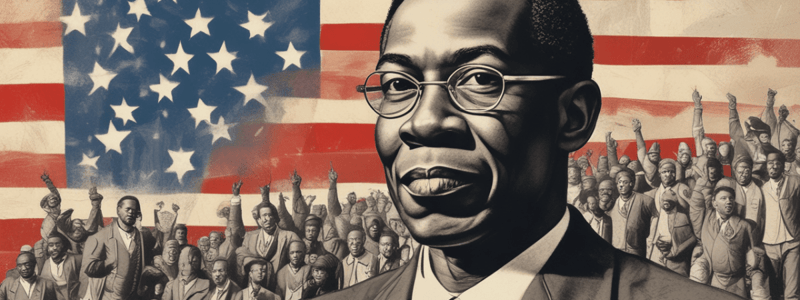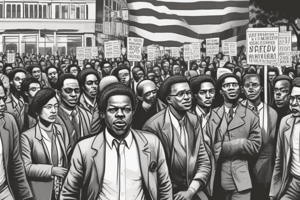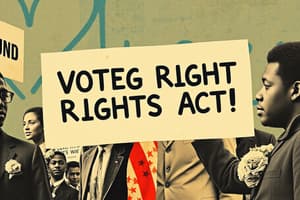Podcast
Questions and Answers
What was a major hurdle for black voters in states like Alabama, Georgia, and Mississippi?
What was a major hurdle for black voters in states like Alabama, Georgia, and Mississippi?
- Voter ID requirements
- Lack of education
- Long voting lines
- Literacy tests (correct)
What was the outcome of the 1964 presidential election for President Johnson?
What was the outcome of the 1964 presidential election for President Johnson?
- Narrow victory
- Lost to Senator Barry Goldwater
- Landslide victory (correct)
- Did not run for re-election
Why did many southern white Democrats leave the Democratic Party in 1964?
Why did many southern white Democrats leave the Democratic Party in 1964?
- Due to Johnson's stance on civil rights (correct)
- Due to Johnson's economic policies
- Due to Johnson's environmental policies
- Due to Johnson's foreign policy
What was the significance of the march from Selma to Montgomery in 1965?
What was the significance of the march from Selma to Montgomery in 1965?
What event prompted President Johnson to call an extraordinary session of Congress to pass the Voting Rights Act?
What event prompted President Johnson to call an extraordinary session of Congress to pass the Voting Rights Act?
What percentage of black voters were registered in Selma, Alabama in 1965?
What percentage of black voters were registered in Selma, Alabama in 1965?
What was the purpose of the Freedom Summer project?
What was the purpose of the Freedom Summer project?
Who led the non-violent march from Selma to Montgomery in 1965?
Who led the non-violent march from Selma to Montgomery in 1965?
What was Martin Luther King Jr.'s goal in meeting with President Johnson?
What was Martin Luther King Jr.'s goal in meeting with President Johnson?
What was the consequence of President Johnson's support of civil rights in the 1964 election?
What was the consequence of President Johnson's support of civil rights in the 1964 election?
What was a significant factor in President Johnson's initial hesitation to support a voting rights bill?
What was a significant factor in President Johnson's initial hesitation to support a voting rights bill?
What was the primary goal of the volunteers who participated in Freedom Summer?
What was the primary goal of the volunteers who participated in Freedom Summer?
What was the outcome of the non-violent march from Selma to Montgomery in 1965?
What was the outcome of the non-violent march from Selma to Montgomery in 1965?
What was the consequence of the violence on Bloody Sunday for President Johnson?
What was the consequence of the violence on Bloody Sunday for President Johnson?
What was the political impact of President Johnson's strong support for civil rights in the 1964 election?
What was the political impact of President Johnson's strong support for civil rights in the 1964 election?
What was the significance of the 1964 presidential election result for President Johnson in the South?
What was the significance of the 1964 presidential election result for President Johnson in the South?
What was the primary obstacle faced by black voters in places like Alabama, Georgia, and Mississippi?
What was the primary obstacle faced by black voters in places like Alabama, Georgia, and Mississippi?
What was the reason for Martin Luther King Jr.'s meeting with President Johnson?
What was the reason for Martin Luther King Jr.'s meeting with President Johnson?
What was the context of the non-violent march from Selma to Montgomery in 1965?
What was the context of the non-violent march from Selma to Montgomery in 1965?
What was the outcome of the 1964 presidential election for Senator Barry Goldwater?
What was the outcome of the 1964 presidential election for Senator Barry Goldwater?
Flashcards are hidden until you start studying
Study Notes
• 1964 presidential election: President Johnson faces pressure from civil rights leaders to support a voting rights bill, but he's concerned about jeopardizing his chances in the election.
• Freedom Summer: Hundreds of volunteers, both white and black, travel to Mississippi to help register black voters.
• Voting restrictions: Despite being legally able to vote, many blacks face obstacles, such as literacy tests, to prevent them from voting in places like Alabama, Georgia, and Mississippi.
• Johnson's dilemma: Johnson's strong support of civil rights leads to many southern white Democrats leaving the party, and his opponent, Senator Barry Goldwater, gains popularity in the South.
• 1964 election results: Johnson wins the election by a landslide, but loses voters in the South.
• Martin Luther King Jr. meets with Johnson, urging him to support voting rights, but Johnson is hesitant.
• Selma, Alabama, 1965: Only 2.1% of blacks of voting age are registered to vote, prompting a non-violent march from Selma to Montgomery, led by civil rights leaders.
• Bloody Sunday: On March 7, 1965, Alabama state troopers violently disperse the marchers on the Edmund Pettus Bridge, injuring many and sparking national outrage.
• Johnson's turning point: The event prompts Johnson to call an extraordinary nighttime session of Congress, demanding passage of the Voting Rights Act.
• Johnson's speech: In a historic address to a joint session of Congress, Johnson speaks out for the dignity of man and the destiny of democracy, echoing the civil rights movement's creed, "We shall overcome."
• Passage of the Voting Rights Act: The bill is passed and signed into law, marking a major victory for the civil rights movement.
• Johnson's legacy: The Voting Rights Act and Medicare are seen as significant achievements, solidifying Johnson's reputation as a champion of civil rights.
Studying That Suits You
Use AI to generate personalized quizzes and flashcards to suit your learning preferences.




